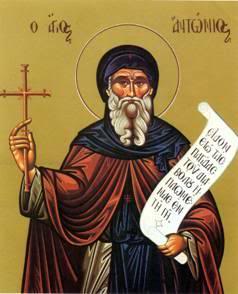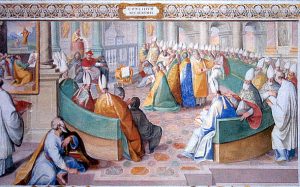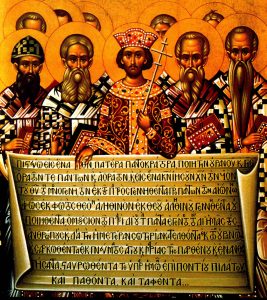“Ancient Baptists” and Other Myths
Fr. Hugh Barbour, O.Praem.
Nicea, August 24, A.D. 325, 7:41 p.m. “That was powerful preaching, Brother Athanasius. Powerful! Amen! I want to invite any of you folks in the back to approach the altar here and receive the Lord into your hearts. Just come on up. We’ve got brothers and sisters up here who can lead you through the Sinner’s Prayer. Amen! And as this Council of Nicea comes to an end, I want to remind Brother Eusebius to bring the grape juice for tomorrow’s closing communion service . . .”

-
Save
As a trained patristics scholar, I always feel a great deal of sadness and frustration when I encounter shoddy historical “scholarship,” whether it be in the pages of The Watchtower, a digest of Mormon “archaeology,” or a popular and usually well-produced Evangelical Protestant apologetics journal. But this article was so error-laden, so amateurishly “researched,” and so filled with historical and theological fallacies, that I simply couldn’t let it stand without response.

-
Save
Calvin’s French Confession of Faith of 1559 states, “And we confess that which has been established by the ancient councils, and we detest all sects and heresies which were rejected by the holy doctors, such as St. Hilary, St. Athanasius, St. Ambrose and St. Cyril.” The Scotch Confession of 1560 deals with general councils in its 20th chapter. The Thirty-nine Articles of the Church of England, both the original of 1562-1571 and the American version of 1801, explicitly accept the Nicene Creed in article 7.
Even when the particular Protestant confessional formula does not mention the Nicene Council or its creed, its doctrine is nonetheless always asserted, as, for example, in the Calvinist Scotch Confession just mentioned, or in the Presbyterian Westminster Confession of 1647.

-
Save
Well, we shouldn’t be too quick to accuse them of inconsistency just yet, for all of these confessions make it abundantly clear that the councils of the Church have no authority of their own, but only insofar as they teach things which have a clear warrant in the written Word of God. ………
For Steve Ray’s Article: The Trail of Blood, Baptist Successionism.



This Post Has 4 Comments
And did not Athanasius seek refuge in Rome under the protection of the Pope when he was forced, by the Arians, to flee from his city?
And another thought regarding Constantine the emperor. Although Constantine is co-recognized as calling the Council of Nicea, he did not fully accept Christianity until his death bed. He was baptized by his cousin who was an Arian, Eusebeios of Nicomedia.
One can also explain the same set of data as follows: “The Protestant belief has traces of Catholic Faith in it.” NOT the other way around.
Clearly the Baptist author was a very confused man. Th council of Nicea was called to deal with a heresy against the Catholic faith. We have many writings before this time, like the Apostolic Fathers, and many, many more who clearly espoused Catholic doctrine on the sacraments, the hierarchical structure of the Church, etc. Why weren’t they condemned along with Arius and his followers? — because the bishops at Nicea, who represented the whole Christian world, saw their faith in the Apostolic fathers and other Catholic writers in the intervening centuries. They were all Catholics, not Baptists.
Comments are closed.